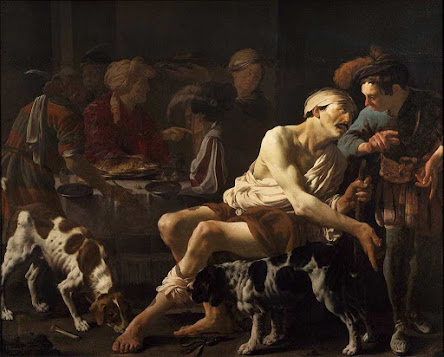And lying at his door was a poor man named Lazarus, covered with sores,
who would gladly have eaten his fill of the scraps
that fell from the rich man’s table.
Who are the people who are lying at our door? The rich man here was not condemned for his riches. He was not asked to sell all he had. He was condemned because he neglected that which was easily within his sphere of influence and his power to address. He walked right by a problem that he could have solved out of surplus resources. He could have kept on wearing purple garments and fine linen and dining sumptuously each day. If he had only been more careful with the surplus from his table Lazarus could also have been fed.
Abraham replied, ‘My child,
remember that you received what was good during your lifetime
while Lazarus likewise received what was bad;
The trouble with receiving good things in this life is not the things themselves, but rather the way they blind us to the needs of those around us. The rich man should have been capable of sympathy with Lazarus, but it was as though he didn't even see him. This is part of the point of Lent. We are meant to wake ourselves from this blindness and this complacency. We are meant to stop drugging ourselves with comfort at least enough to gain empathy for the needs of others.
Maybe we're afraid to look at Lazarus, afraid that if we begin with him we will be overwhelmed by the problem of which he is merely a symptom. Yet this was not the attitude of Jesus, who had compassion on the crowds even if not immediately on the whole world. Jesus was able to do this because he knew that the Cross would ultimately set things right for all the poor and neglected in the world. The compassion he showed to the crowds would finally have value, even though the poor would always been with us, because that compassion participated in the Cross and therefore drew its recipients on toward the resurrection. We too can love without being overwhelmed, knowing that what we can do, in our own limited spheres, will be taken up into something greater, something that makes it meaningful in a lasting way.
but now he is comforted here, whereas you are tormented.
We have another option which tempts us, however, and against which we must be on guard. We can and do ignore even those things that are close at hand and in our power. But these are opportunities to experience Jesus himself, present in the poor. We need to use them to learn to love him as he desires to be loved, in deed and in truth, and not just in affection and thought.
If anyone says, “I love God,” and hates his brother, he is a liar; for he who does not love his brother whom he has seen cannot love God whom he has not seen (see First John 4:20)
It may seem like the comforts we seek will actually give us peace but they really only provide distraction. Seeking our strength in flesh ends up with us feeling like we are a barren bush in the desert that enjoys no change of season. Paradoxically, when we learn to seek our reward in God by following his ways we experience a peace and joy that this world cannot give (see John 14:27).
He is like a tree planted beside the waters
that stretches out its roots to the stream:
It fears not the heat when it comes,
its leaves stay green;

No comments:
Post a Comment